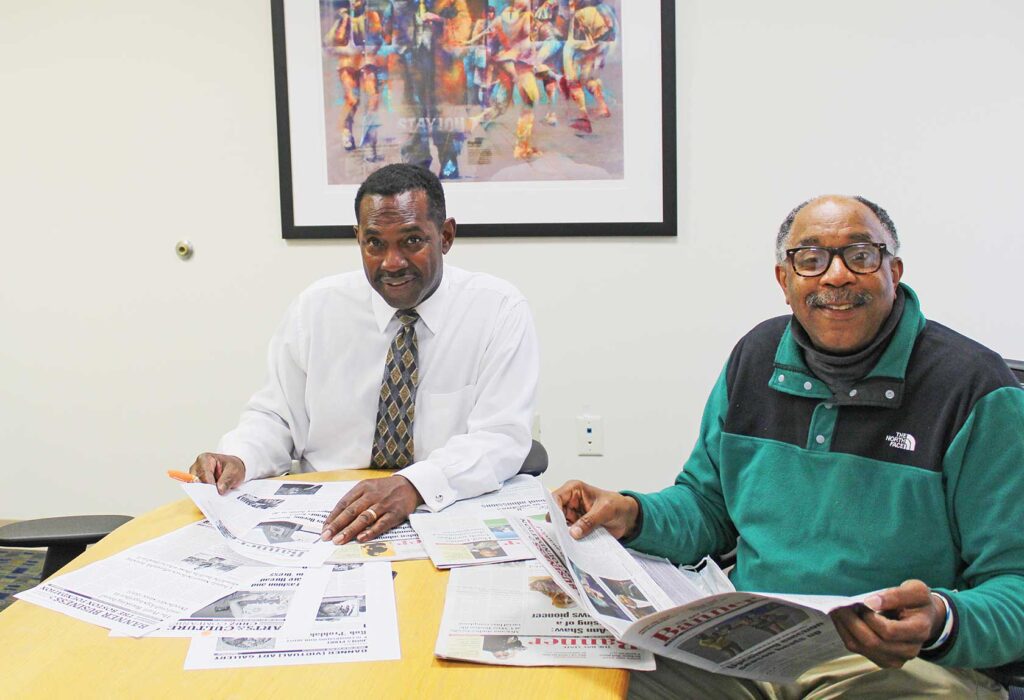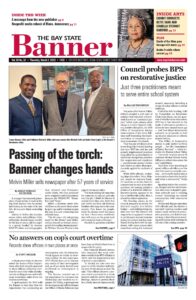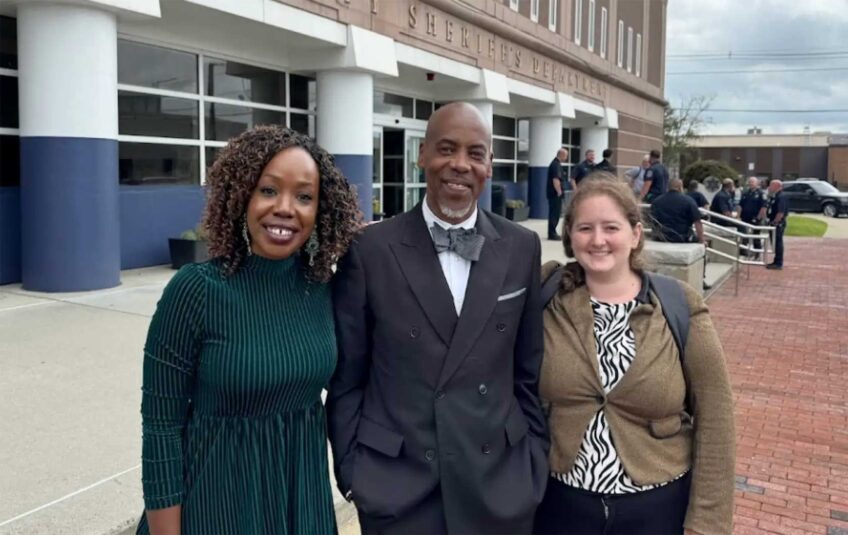In their first year, Banner’s new owners aimed to preserve legacy with their eyes set on growth

A little over a year ago, the Bay State Banner came under new ownership, signifying a fresh era for New England’s oldest and Boston’s only Black-owned weekly newspaper. Taking over from founder Melvin B. Miller, veteran journalists and entrepreneurs Ron Mitchell and André Stark aimed to uphold a legacy that spanned nearly six decades.
“I take the responsibility of telling Black and brown stories seriously,” said Mitchell in an interview. His skills as a broadcast journalist and experiences as the child of community activists, he said, gave him a leg up when he stepped into the role and made him and Stark strong collaborators.
For his part, Stark perceived an opportunity to fill a gap in the region’s news coverage.
“I saw the fact that there was potential to expand the reach of the paper because there were a lot of news deserts in New England for people of color,” he said in an interview, adding that stories about African American and immigrant communities were scant in some areas outside of Boston. Taking over the paper was a way to rectify that.
The Banner’s first year under the pair’s leadership was marked by rapid change. With the help of Colin Redd, the Banner’s director of sales, Mitchell and Stark expanded the paper’s digital footprint, modernizing its website to include a Virtual Art Gallery and pull in more revenue.
Internally, Mitchell and Stark added to the paper’s staff, creating two full-time staff writer positions. Most recently, they hired a full-time managing editor, Jamyra Perry, formerly with the Philadelphia Tribune.
The Banner’s print paper grew in physical size to a broadsheet format and now features dedicated, sponsor-supported sports and business sections.
These shifts, Mitchell said, have helped diversify the paper’s content, which will “also hopefully increase our readership” and have a positive impact on the communities, including Vermont, New Hampshire, Maine, Rhode Island and Connecticut.
“The Banner for a while has been one of the best Black weekly newspapers in the country,” said Kenneth Cooper, a journalist who served first as a consultant for the Banner and later as interim managing editor. “And I think Ron and André are headed in the direction of making it even better.”
In the approximately seven months he served as the paper’s interim managing editor, Cooper said, he emphasized “what I think are the most important issues for Black people in this moment in history,” such as economic and political empowerment and criminal justice. Cooper also prioritized stories with longer shelf lives.
Each week, the Banner has maintained its finger on the pulse of the Boston and New England arts scene while covering the news on immigration, student protests over the war in Gaza and pharmacy closures in Boston’s Black neighborhoods.
“The Banner has kept its long tradition … of putting the spotlight on issues that really matter to Black people in this area,” said Meghan Irons, an associate professor of the practice of impact journalism at Boston University and a freelance reporter.
Irons, who held contributing editor and interim managing editor roles at the Banner in the last year, pointed to the paper’s coverage of Franklin Park’s White Stadium. Last year, the city of Boston proposed a partnership with Boston Unity Soccer Partners that would see the dilapidated White Stadium refurbished for occasional use by a professional women’s soccer team.
“Like all big projects, every idea seems to be great for the city,” Irons said. “But the Banner has kept its eyes on what that move would actually mean for the people who live near the stadium.”
Brian Wright O’Connor, who was the Banner’s managing editor from 1984 to 1992 and also served during the past year as interim managing editor, shared a similar sentiment regarding the paper’s “very aggressive coverage” of the challenges faced by the Edgar P. Benjamin Healthcare Center, a historically Black nursing home in Mission Hill.
Until the Banner began investigating the allegations of mismanagement, it seemed that the Benjamin was headed for closure, he said. But the coverage, reported primarily by staff writer Avery Bleichfeld, garnered public and political support for the facility and attracted the courts’ attention, transforming the course of the healthcare center’s future.
“The Banner has always paid close attention to local politics, education and economic development,” O’Connor said. But the financial resources brought in via the new leadership have allowed the paper “to spread its wings a little more regularly.”
In the past year, the Banner expanded its coverage to other African American communities in Massachusetts, including those in Randolph and Brockton, the latter being the locale of one of the Banner’s expanding reader bases, according to Stark. The paper’s editorial team also paid attention to the difficulties facing African nations, reporting on food insecurity in Southern Africa and Sudan and a tense election season in South Africa.
During his time as interim managing editor, O’Connor said, he was supported by a “broad roster of Banner veterans” who assisted him in helping the paper continue its work after it changed hands.
Looking to the future, the new owners said they plan to continue widening the paper’s reach, with Stark saying he wants the Banner to be part of a consortium of Black-focused papers across the U.S. The Banner’s strategy of telling stories beyond Boston and Massachusetts is “salient,” he added, because readers need to know that “there are other people of color flourishing in other states.”
Irons lauded the Banner’s already expansive coverage and emphasized the paper’s focus on “telling rich and powerful stories” about the African diaspora as a whole, a feat she said “no other news entity” tackles to that extent.
“Taking over a news entity, especially one that has deep roots here in the city, will always be a challenge, but I think the Banner has been able to navigate that very well,” Irons said. She added that she hopes “the Banner will continue to thrive, that it will continue to tell our stories, that it will grow and expand, and that it will be around for the next 100 years.”







